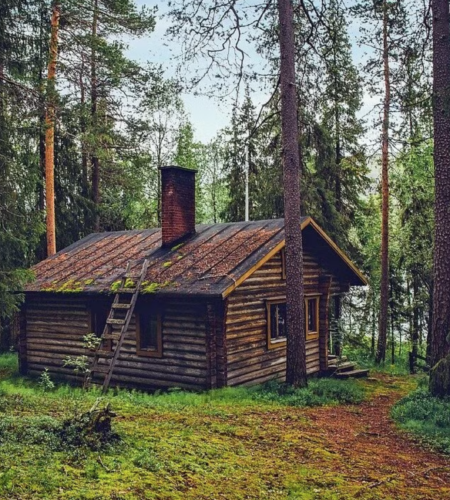(Image Credit: pinterest)
The idea of living off-grid is incredibly appealing. Imagine a life free from utility bills, surrounded by nature, and powered entirely by renewable energy. It’s a dream that many of us have entertained, significantly as concerns about climate change and the fragility of our infrastructure grow. But can this dream become a sustainable reality? The truth is, living off-grid comes with significant challenges that often go overlooked. These challenges can include practical difficulties like generating enough power to sustain a household, managing water supply, and dealing with waste.
The Appeal of Off-Grid Living There’s something to the independence and self-sufficiency that comes with living off the grid. For many, it represents a way to escape the rat race, reduce their carbon footprint, and live in harmony with the environment. The idea of being completely self-reliant—growing your own food, generating your own power, and managing your own water supply—is not just appealing, it’s incredibly empowering. In an age where technology connects us to everyone but often leaves us feeling more disconnected, the thought of retreating to a simpler life is inspiring and can fill you with a sense of empowerment.
The Challenges of Going Off-Grid However, living off-grid is far more complex. First, there are the practical difficulties. Generating enough power to sustain a household requires significant investment in solar panels, wind turbines, or other renewable energy sources. Additionally, you’ll need reliable energy storage solutions, such as batteries, to ensure you have power when the sun isn’t shining or the wind isn’t blowing.
Water sourcing is another critical challenge. Off-grid homes often rely on rainwater collection or wells, which require careful management and maintenance. Waste management, too, can be complicated; composting toilets and septic systems must be adequately maintained to avoid health hazards.
The Cost Factor Financially, the initial setup for off-grid living can be daunting. While you’ll save on utility bills in the long run, the upfront costs of solar panels, batteries, water systems, and waste management solutions can be substantial. Additionally, off-grid systems may require ongoing maintenance and repairs depending on where you live, which can add to the expense.
However, it’s worth noting that the long-term financial benefits can be significant. Once your systems are in place and functioning efficiently, the ongoing costs are relatively low. Moreover, many people find that the lifestyle changes necessary for off-grid living—such as growing their own food and using less energy—lead to substantial cost savings, providing a sense of financial reassurance and security.
Sustainability and Legal Issues Sustainability is another critical factor. While off-grid living can be highly sustainable in the right environment, it’s not always a viable option everywhere. For example, water scarcity can make off-grid living challenging in arid climates. Additionally, off-grid systems may not be able to handle the energy demands of large households or those with high electricity usage.
Legal issues can also arise. Zoning laws or building codes may restrict or prohibit off-grid living in some areas. It’s essential to research local regulations before going off-grid to avoid potential legal complications.
Living off-grid is a dream for many, but it’s not a decision to be made lightly. While the appeal of independence and sustainability is strong, the practical, financial, and legal challenges can be significant. For those who are well-prepared and committed, off-grid living can be a fulfilling and sustainable way of life. However, it’s essential to go into the process with a clear understanding of the realities involved, ensuring you feel fully informed and prepared for the journey ahead.


